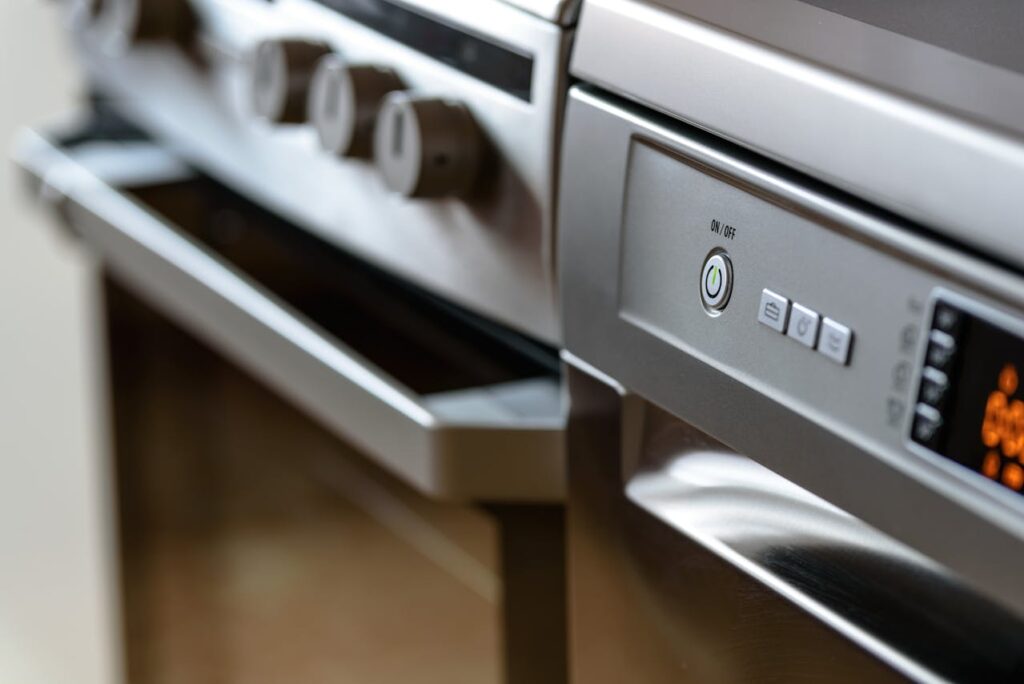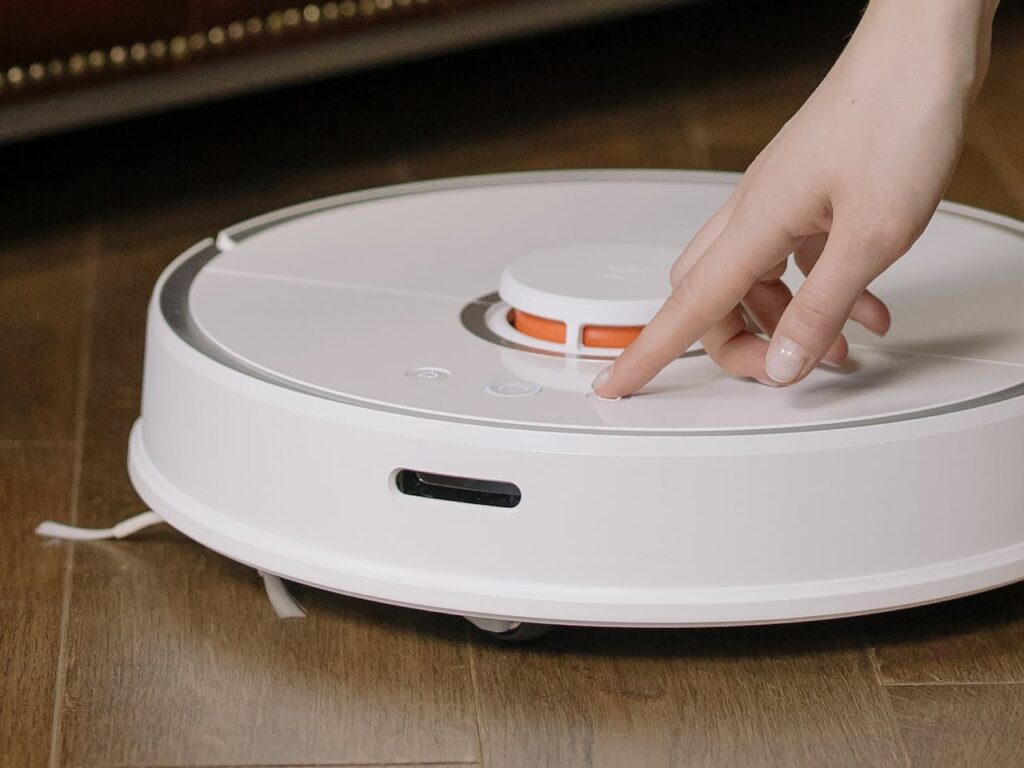Taking care of your home appliances is a little like taking care of a car. If you give them a little attention now, they’ll last longer and work better later.
That means fewer breakdowns, lower energy bills, and more peace of mind. Whether it’s your fridge, washing machine, or oven, every appliance plays a role in your daily routine.
And just like anything else you use often, they need a bit of love to keep going strong.
In this guide, we’ll go over simple, smart appliance maintenance tips to help you take care of the machines that help take care of you. Don’t worry—these are things anyone can do. No fancy tools or deep technical know-how required.
Key Takeaways
- Clean regularly – Wipe down surfaces, clear out filters, and check for dust. Clean machines run better and last longer.
- Watch for warning signs – Strange noises, odd smells, or leaks are your appliances trying to say, “Help!” Don’t ignore them.
- Don’t overload – Whether it’s a washer or a dishwasher, packing too much in can cause damage and waste energy.
- Check seals and hoses – Cracks or loose fittings can lead to water leaks or lost efficiency. A quick check now can prevent a big mess later.
- Read the manual – It’s not the most exciting book on the shelf, but it’s full of useful info. Each appliance is a little different, and the manual tells you exactly how to treat it right.
Why Maintenance Matters More Than You Think

Maintenance may seem small, but it does a big job. It keeps things working the way they should. When you take care of your appliances, they don’t have to work as hard.
That means they use less energy, break down less often, and last longer.
Here’s a break down:
- It saves money. A well-maintained appliance is less likely to surprise you with a big, expensive repair. Think of it as catching a small problem before it becomes a big one.
- It keeps your home safe. Some machines—like dryers and ovens—can cause fires if they get too dirty or worn out. Cleaning vents or checking cords can help prevent that.
- It protects your time. When something breaks, it throws your whole day off. A simple routine check can help avoid those surprises.
So yes, it might just be wiping a lint filter or checking a hose, but those little steps really add up. A little care goes a long way!
Know Your Warranty: What Maintenance Is Required to Keep It Valid?
Warranties can feel a bit like the rules to a board game—easy to skip until something goes wrong. But here’s the thing: your appliance’s warranty can save you a lot of money if you follow the rules.
Most appliances come with a warranty from the manufacturer. It’s basically a promise: “If this breaks too soon, we’ll fix it.” But there’s a catch—you have to take care of the appliance properly.
Here’s what that usually means:
- Do regular maintenance. This might include things like cleaning filters, checking hoses, or getting a yearly tune-up. If you skip this, the warranty might not cover repairs.
- Use it the right way. Overloading a washer or using the wrong cleaner in a dishwasher can count as “misuse,” which can void your warranty.
- Keep your receipts and records. If you have proof that you cleaned your appliance or got it serviced, it’s easier to get help if something breaks.
Think of your warranty like a helpful umbrella. It’s there to protect you—but only if you don’t poke holes in it. Taking care of your appliances is part of keeping that umbrella strong and ready.
Appliance Maintenance Tips Every Homeowner Should Know
Keeping your household appliances in good shape doesn’t have to be complicated. With just a few simple habits, you can help them last longer, work better, and even lower your utility bill. Think of these as your go-to maintenance tips—the kind that make a big difference with just a little effort.
Let’s walk through 25 smart ways to care for the appliances in your home.
Clean Refrigerator Coils Every 6 Months
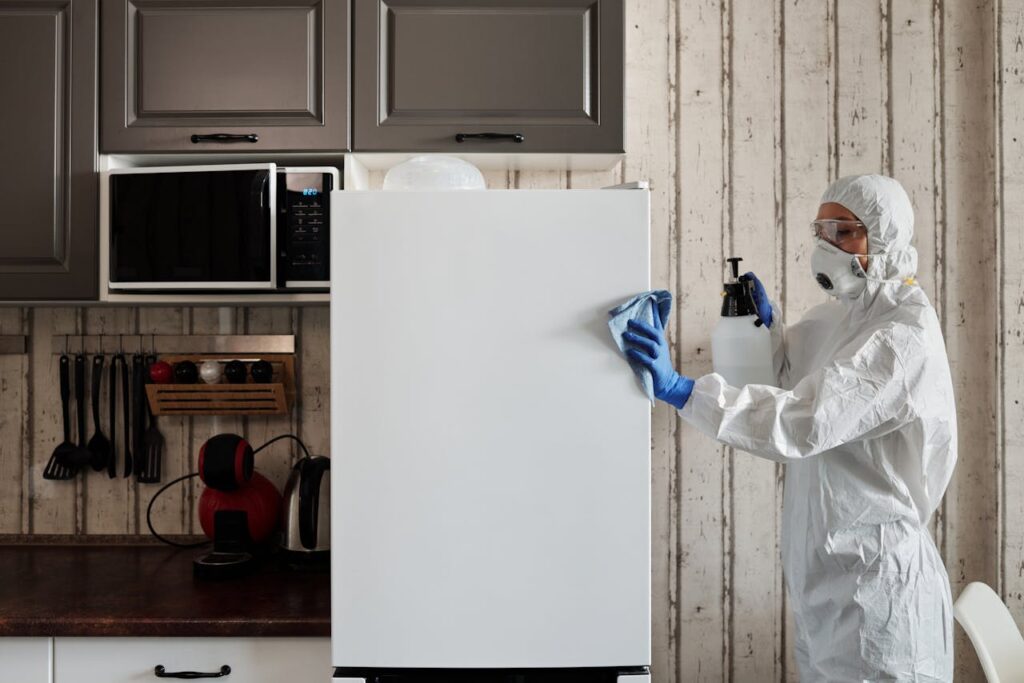
Your fridge works hard every day. But when dust and pet hair stick to the coil on the back or bottom, it has to work even harder. That’s like trying to run while wearing a heavy backpack!
Use a vacuum or a coil cleaning brush to remove the dirt. Doing this every six months helps your fridge stay cool without wasting energy—and it can boost its longevity too.
- Unplug the fridge before cleaning to stay safe.
- Use a coil brush or vacuum attachment to remove dust.
- Gently sweep under the fridge while you’re at it.
- Mark your calendar to repeat every spring and fall.
Replace HVAC Filters Every 1–3 Months
A clogged air filter is like trying to breathe through a sock. Your heating and cooling system needs clean filters to move air properly.
Replacing your filter every 1 to 3 months helps your system run smoothly and keeps your indoor air fresh. Bonus: it also protects moving parts inside your HVAC from dust and debris.
- Set a reminder to check the filter monthly.
- If it’s gray or dusty, swap it out.
- Choose the right size and type for your system.
- Write the date on the new filter so you know when it went in.
Run Vinegar Through the Dishwasher Monthly
Dishwashers do the dirty work, but even they need a good clean! Over time, grease, food bits, and buildup can block the spray arms and slow things down.
Once a month, run an empty cycle with a cup of white vinegar. It’s an easy, DIY way to keep things fresh and running like new. And if there’s ever a spill or funky smell? Vinegar can help with that, too.
- Pour 1 cup of white vinegar into the bottom of an empty dishwasher.
- Run a hot water cycle to clean and freshen it.
- Remove and wipe down the filter if it looks dirty.
- Check the door seal for buildup while you’re at it.
Scrub Lint from the Dryer Vent Yearly
Cleaning your dryer’s lint trap is a great daily habit—but once a year, go deeper. Lint sneaks into the dryer vent over time, and that’s a fire risk.
Unplug the dryer, remove the vent hose, and use a brush to scrub out the lint. It’s quick, and it helps your dryer dry clothes faster and safer. Plus, it cuts down on extra heat and vibration, which can wear your machine out sooner.
- Unplug the dryer and pull it away from the wall.
- Disconnect the vent hose and use a dryer brush to remove lint.
- Vacuum inside the hose and vent opening.
- Reconnect everything securely before pushing the dryer back.
Vacuum the Fridge Gasket to Maintain Seal
The gasket is that rubber strip around your fridge door. It keeps cold air in and warm air out—kind of like weather-stripping for your food.
If the gasket gets dirty, it can’t seal well. That means cold air leaks out, and your fridge works harder to stay cool. Use a cloth or vacuum hose to clean it every few months. While you’re at it, inspect it for cracks or wear.
- Use a vacuum hose or damp cloth to clean around the rubber seal.
- Check for food crumbs or sticky spots that could break the seal.
- Test the seal by closing a dollar bill in the door—if it slides out easily, the gasket might need replacing.
- Wipe dry to prevent mold or mildew.
Descale Your Coffee Maker Every 2–3 Months
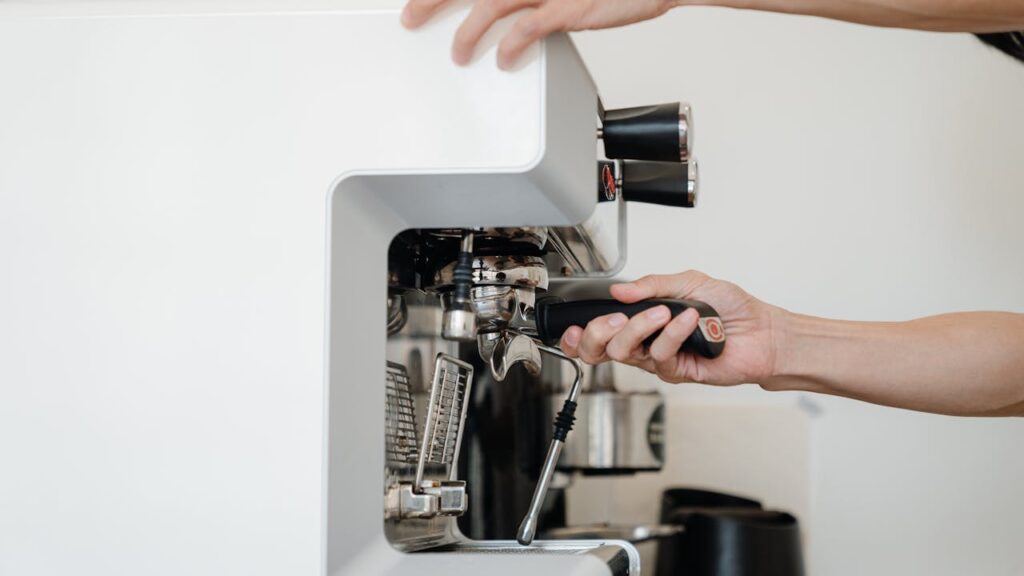
If you love your morning cup of coffee, your coffee maker deserves a little love too. Over time, minerals from water build up inside the machine. This buildup can slow things down or even change the taste of your brew.
To fix this, run a mix of water and vinegar through your machine every few months. It’s called “descaling,” and it helps everything flow like it should. Think of it as a gentle reset for your coffee maker!
- Fill the reservoir with half vinegar, half water.
- Run a brewing cycle without coffee grounds.
- Rinse by running clean water through 1–2 more cycles.
- Wipe down all parts after you’re done.
Wipe the Microwave Interior Weekly
Spills and splatters happen—especially in microwaves. Food can bubble over or pop, leaving little messes behind.
Wipe the inside with a damp cloth once a week. If something’s stuck on, microwave a bowl of water for a minute first. The steam helps loosen it up. Regular cleaning keeps smells away and helps your microwave stay in good working shape.
- Use a damp cloth or sponge to wipe down the inside.
- For stuck-on messes, microwave a bowl of water for 1–2 minutes first to loosen grime.
- Don’t forget to clean the turntable and under it.
- Leave the door open for a few minutes to air out.
Clean the Range Hood Filter Monthly
Your range hood helps pull smoke, steam, and grease out of the air when you cook. But the filter can get greasy fast.
Take it out once a month and give it a good wash with hot, soapy water. If it’s dishwasher-safe, even better! This simple habit keeps air flowing well and can reduce the strain on your air conditioner, too.
- Remove the filter and soak it in hot, soapy water.
- Scrub with a brush if grease is stuck on.
- Rinse well and let it dry fully before reinstalling.
- Wipe the outer surface of the hood while you’re at it.
Check Stove Burners for Clogs Monthly
Gas burners need a clear path for the flame. If something gets in the way—like a bit of food or grease—the burner might not work right.
Once a month, lift the grates and look underneath. If you see any clogs, gently clear them with a pin or paperclip. Be careful, though—always make sure everything’s off and cool before you start.
This is one of those little steps in appliance care that can really help make your appliances last.
- Remove burner grates and caps to inspect them.
- Use a paperclip or needle to gently clean clogged holes.
- Wash removable parts with warm, soapy water.
- Let everything dry fully before putting it back together.
Inspect Washing Machine Hoses Yearly
Hoses carry water in and out of your washer. If they crack or loosen, they can leak—and that can mean a big mess.
Once a year, take a few minutes to check the hoses in the back. Look for any signs of wear, and make sure the connections are tight. If anything looks old or worn out, it’s better to replace it now than to need a repair service later.
And while we’re talking about washers, one quick reminder: avoid overloading the drum. Too much laundry at once can stress out your machine and lead to problems down the road.
- Pull the washer away from the wall to check hoses.
- Look for cracks, leaks, or bulges in the hose.
- Make sure connections are tight at both ends.
- Replace old hoses with stainless steel ones for extra safety.
Leave the Washer Door Open After Use
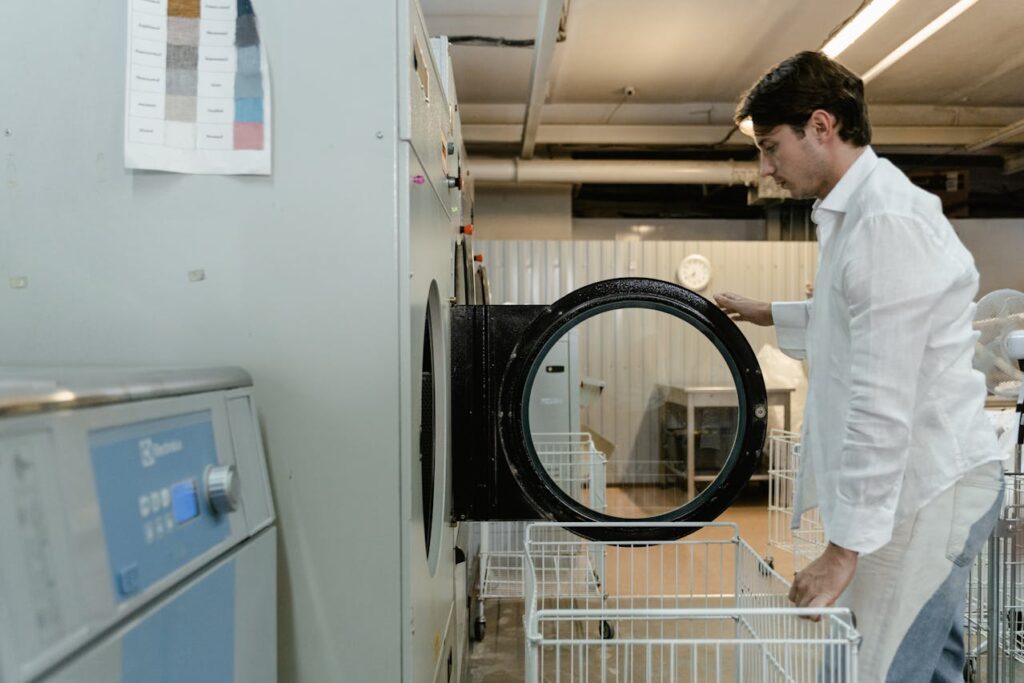
After you wash your clothes, it’s a smart idea to leave the washer door open for a while. This helps air move around inside and dries out any leftover water.
Why does this matter? Because a closed, damp washer is the perfect place for mold and bad smells to grow. Think of it like airing out a wet towel—it just makes sense. And it helps keep your washer fresh for the next load!
- Prop the door open after every load to let air flow.
- This helps prevent mold and mildew inside the drum.
- Wipe down the rubber gasket after each use.
- Remove damp clothes promptly to reduce musty smells.
Clean the Dryer Lint Trap After Each Load
This one’s super easy—and super important. Every time you dry clothes, lint collects in the trap. If you don’t clean it, your dryer has to work harder. It can even become a fire hazard.
Just pull out the lint screen, remove the fuzz, and pop it back in. That’s it! A clean trap helps your dryer run better and use less energy. And since appliances are expensive, this small step helps protect your investment.
- Remove lint from the trap before or after every use.
- Check for lint buildup around the trap area too.
- Wash the screen with soap and water once a month.
- Never run the dryer without the lint screen in place.
Tighten Loose Appliance Handles
Handles on ovens, fridges, and dishwashers can get loose over time. When they wiggle or feel shaky, it’s a sign they need a quick fix.
Use a screwdriver to gently tighten any loose screws. It takes just a minute and helps prevent bigger damage later on. Keeping handles secure is part of using your appliances the right way—what we call proper appliance care.
- Grab a screwdriver and check each handle monthly.
- Tighten loose screws carefully without over-tightening.
- Use thread-locking glue if screws keep slipping.
- Replace missing screws with matching ones from a hardware store.
Test Smoke Alarms Monthly
Okay, this one isn’t just about appliances—it’s about safety. Smoke alarms help keep your home safe from fire. But only if they work.
Press the “test” button on each alarm once a month to make sure it beeps. If it doesn’t, you may need to clean or replace the batteries. It’s a small task with a big purpose—and it could save a life.
- Press and hold the test button until the alarm sounds.
- If it’s quiet or chirping, replace the batteries.
- Use a broom handle if the alarm is hard to reach.
- Replace alarms that are more than 10 years old.
Clean Garbage Disposal with Ice and Citrus
Garbage disposals can start to smell if food bits get stuck inside. But don’t worry—cleaning them is easier than you might think.
Toss in a few ice cubes and a slice of lemon or orange. Then turn on the disposal and let it grind everything up. The ice helps knock off stuck debris, and the citrus makes it smell fresh. It’s a clever little trick that saves money in the long run by keeping things clean and clog-free.
- Drop in a handful of ice cubes and a few lemon or orange peels.
- Turn on cold water, then run the disposal for 30 seconds.
- The ice helps knock loose stuck bits.
- The citrus peels freshen the smell.
Flush Your Water Heater Once a Year
Over time, sediment settles at the bottom of your water heater. That makes it work harder to heat water, which can lead to costly repairs or even a shorter life for the heater.
Once a year, drain a few gallons from the bottom to flush out the gunk. This helps the heater stay efficient and reliable. You’ll get hot water faster—and you’ll help extend their lifespan.
- Turn off power or gas before starting.
- Connect a hose to the drain valve and empty a few gallons into a bucket.
- Look for cloudy water or sediment.
- Close the valve, remove the hose, and refill.
Check Your Oven Door Seal for Heat Leaks
Your oven needs a tight seal to keep the heat inside. If the seal is loose or worn out, hot air escapes. That means longer cooking times and wasted energy.
Open the oven and take a close look at the rubber seal around the door. If you see cracks or feel air leaking when it’s on, it might be time to clean or replace the seal. It’s a small fix that saves energy and keeps your food cooking evenly.
- Open the door and feel the rubber seal all the way around.
- Look for cracks, gaps, or flattened areas.
- Replace the seal if it’s damaged—it helps keep heat in.
- Avoid leaning on the oven door, which can loosen the seal over time.
Clean Your Toaster Crumb Tray Weekly
Toasters do a great job, but they collect a lot of crumbs. If the tray gets too full, it can burn the crumbs—or even start a small fire.
Slide out the crumb tray once a week and dump it in the trash. Give it a quick wipe, and you’re good to go. It’s one of the easiest ways to keep a proper appliance working safely.
- Unplug the toaster before cleaning.
- Slide out the crumb tray and shake it over the sink or trash.
- Wash the tray with warm, soapy water and dry it.
- Wipe the inside of the toaster upside down (gently!).
Wipe Your TV Screen with a Microfiber Cloth

TVs might not have moving parts, but they still need care. Dust and fingerprints can build up and make your screen look dull.
Use a dry microfiber cloth—no sprays, no paper towels. Just gentle, steady pressure. It’ll keep your picture clear and your screen looking like new.
- Turn off the TV and let it cool first.
- Use a dry microfiber cloth to gently wipe the screen.
- Don’t spray cleaner directly—use a damp cloth if needed.
- Avoid using paper towels or harsh chemicals.
Dust Behind Large Appliances Quarterly
Out of sight, out of mind—but not out of trouble! Dust behind your fridge, washer, or stove can block airflow and overheat parts.
Every few months, pull those big appliances out just enough to clean behind them. Use a vacuum hose or a duster. It’s a quick job that helps your machines breathe easier and saves money in the long run.
- Carefully pull out your fridge, washer, or stove.
- Use a long duster or vacuum to remove dust and lint.
- Wipe the floor and nearby wall too.
- Push the appliance back slowly to avoid damaging hoses or cords.
Check That Your Fridge Stays Below 40°F
Your fridge needs to stay cold—really cold. If it goes above 40°F, food can spoil faster and bacteria can grow.
Most fridges have a built-in thermometer, but you can also buy a small one to double-check. If the temperature is too warm, adjust the dial or setting. Keeping things cool helps your food stay fresh and your fridge run properly.
- Use a fridge thermometer to double-check the temperature.
- Adjust the control dial if it’s too warm.
- Avoid overstuffing the fridge—it needs airflow.
- Clean vents inside the fridge to help it cool evenly.
Defrost Your Freezer if Frost Gets Thicker Than ¼ Inch
A little frost in the freezer is okay. But when it starts to pile up thicker than a quarter-inch, it’s time to defrost.
Frost can block airflow and make your freezer work too hard. That wastes energy and shortens the life of the machine. Unplug it, let it melt, and wipe it clean. Doing this now and then is a great way to help your freezer last longer.
- Unplug the freezer and remove food items.
- Let the frost melt naturally, or place bowls of hot water inside to speed it up.
- Wipe out melted water with towels.
- Plug it back in and reload once dry.
Inspect Dishwasher Spray Arms for Blockages
The spray arms in your dishwasher spin and spray water to get your dishes clean. But sometimes bits of food or hard water can block the tiny holes.
Take a look every couple of months. If you see anything stuck, use a toothpick or small brush to gently clean it out. This is one of those simple things that keeps your dishes sparkling and your dishwasher running strong.
- Remove the spray arms and rinse under water.
- Use a toothpick to clear clogged holes.
- Spin the arms to check for free movement.
- Reattach them firmly after cleaning.
Lubricate Garage Door Hinges Twice a Year
Garage doors have a lot of moving parts, and those parts need a little help to stay smooth.
Twice a year, spray a bit of lubricant on the hinges, rollers, and tracks. Think of it like oiling a squeaky bike chain. It reduces strain on the motor and helps the door open quietly and safely. It’s a small step, but it protects your whole garage door system.
- Use a silicone spray or garage door lubricant.
- Apply to hinges, rollers, and springs—just a small amount.
- Wipe off any drips or excess oil.
- Test the door to make sure it opens and closes smoothly.
Keep Appliance Manuals for Quick Troubleshooting
Every machine comes with a manual, and even though they aren’t exactly fun reading, they’re super useful.
Manuals show you how to use your appliances the right way, how to fix common problems, and when to clean or replace parts. That means faster answers and fewer calls for help. If you’re not sure where yours are, now’s a good time to gather them up and store them in one spot!
Understanding how to use each proper appliance the right way is key to keeping it healthy for years to come.
- Store manuals in a folder or binder in a kitchen drawer.
- Use sticky notes or labels to mark key pages.
- Check the manual before calling for help.
- If you’ve lost one, search online using your appliance model number.
Conclusion
Taking care of your appliances doesn’t have to be a big chore. A few small habits, like cleaning filters or checking for leaks, can go a long way. It’s all about staying one step ahead. When you keep your appliances happy, they’ll keep your home running smoothly.
Think of it as teamwork—you do your part, and they’ll do theirs. Over time, you’ll save
money, reduce stress, and maybe even feel a little proud every time that dishwasher hums to life without a hitch.
Now that you’ve got the basics and a list of appliance maintenance tips, you’re ready to give your appliances the care they deserve!
FAQs
1. How to maintain a home appliance?
Start by reading the care and maintenance instructions in your manual. Then follow basic routines like regular cleaning, checking parts for wear, and unplugging machines before DIY care. These care tips help you prevent breakdowns and keep your appliances running smoothly.
2. Is it worth repairing 20-year-old appliances?
It depends. If appliance repair costs more than half the price of a new one, it might be better to replace it. However, some minor appliance issues, like a broken handle or clogged filter, are worth fixing—especially if the machine has been well cared for.
3. What is the best thing to clean appliances with?
Use warm water, mild dish soap, and a soft cloth for most surfaces. For tougher grime, a stiff kitchen brush or vinegar mix works well. Just avoid harsh cleaners that can damage finishes. Always follow tips and guidelines in the manual.
4. What is the proper maintenance of a refrigerator?
Keep your refrigerator clean and cool! Vacuum and clean the coils every 6 months, wipe spills quickly, check the refrigerator door seal, and make sure the fridge stays below 40°F. These steps help extend the lifespan of your appliances.
5. How can I make my appliances last longer?
The key is regular cleaning and maintenance. Don’t overload your washer or dryer, clean filters and vents, and follow a seasonal maintenance checklist. These preventive maintenance steps can really extend the lifespan of your appliances.
6. What appliances need the most regular care?
Your washer and dryer, refrigerator, and air conditioner top the list. They have moving parts that need cleaning and inspection. Performing basic appliance maintenance tasks keeps them safe and efficient.
7. What should I do if an appliance breaks?
First, unplug it. Then check the manual for troubleshooting steps. If it’s a minor appliance issue, you may be able to fix it yourself. If not, call a qualified appliance repair service. Avoid using broken appliances—they can be unsafe.
8. How do I prevent appliance damage from buildup?
Simple: clean regularly! Wipe surfaces, descale where needed, clean the lint trap after each dryer use, and don’t let food or grease sit. Following these cleaning and maintenance steps will prevent costly buildup and keep your appliance running.
9. Why is appliance maintenance so important?
Appliances are valuable investments. Giving them proper care protects that value. Routine tasks reduce energy use, prevent breakdowns, and extend the appliance’s lifespan. It’s the importance of regular maintenance in action.
10. How do I organize a home appliance maintenance plan?
Start with a list. Group tasks by frequency: daily, monthly, or seasonal maintenance. Use calendar reminders to stay on track. A comprehensive guide or checklist makes it easy to manage and helps you maintain your appliances stress-free.


